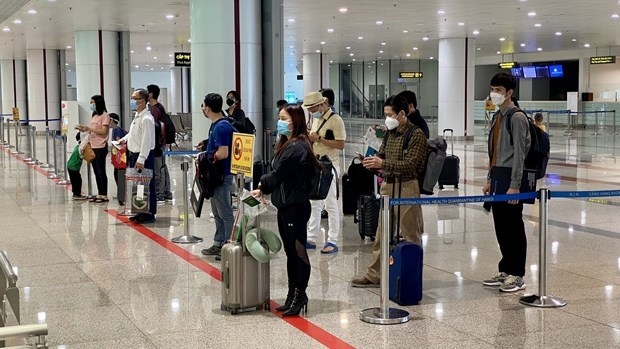Spokeswoman gives more details on Vietnam’s plan to reopen to int’l visitors
Spokeswoman of the Ministry of Foreign Affairs (MoFA) Le Thi Thu Hang on March 17 provided more details about Vietnam’s plan to reopen its door to foreign visitors, including regulations on arrivals and medical requirements.

Addressing the ministry’s regular press meeting held virtually, she said the Ministry of Health on March 15 issued Document No. 1265/BYT-DP on COVID-19 prevention and control for foreign arrivals to Vietnam.
Accordingly, those entering the country by air need to show a negative result of RT-PCR tests for the coronavirus SARS-CoV-2 within 72 hours or of rapid antigen tests within 24 hours prior to their departure.
The arrivals going by road, railway, and sea can do the same if their travel time is short, but need to undergo testing at border gates before entering Vietnam if the travel time is long. In the latter case, if the test result is negative, they can leave their accommodations and have to take the regulated anti-pandemic measures, Hang noted.
People entering Vietnam have to make health declarations prior to their entry, monitor their health, and use health declaration app PC COVID as in line with regulations while staying in Vietnam, she added.
To implement the Vietnamese Government’s policy of reopening tourism in the new normal, ministries and sectors have actively coordinated with one another and devised guidelines on the entry procedures and reception for international visitors to Vietnam.
On March 15, basing on the MoFA’s proposal, the Government agreed to restore the pre-pandemic entry policy for foreigners and overseas Vietnamese people. The same day, the Ministry of Culture, Sports and Tourism issued a tourism reopening plan for inbound and outbound tourists, and those making domestic trips by air, road, railway, and sea.
Meanwhile, the Ministry of Health has promulgated guidelines on COVID-19 prevention and control for arrivals, which is in conformity with Article 16.1 in the law on entry, exit, transit, and residence of foreigners in Vietnam.
Hang explained that foreign tourists to Vietnam can contact and ask international travel companies in the country to represent them to handle procedures at the Immigration Department and then receive their visas at Vietnam’s overseas representative agencies or the agencies authorised to grant visas such as the Vietnam Economic and Cultural Office in Taipei.
The MoFA has ordered the overseas representative bodies and the authorised agencies to grant visas to coordinate with domestic relevant agencies to deal with visa demand from people entering Vietnam for tourism, as well as business and investment purposes.
Vietnam has resumed visa exemption for foreigners in accordance with the international treaties to which it is a party, or waived visa on the basis of reciprocity with some countries, including Southeast Asian nations like Singapore and Thailand, according to the spokeswoman

